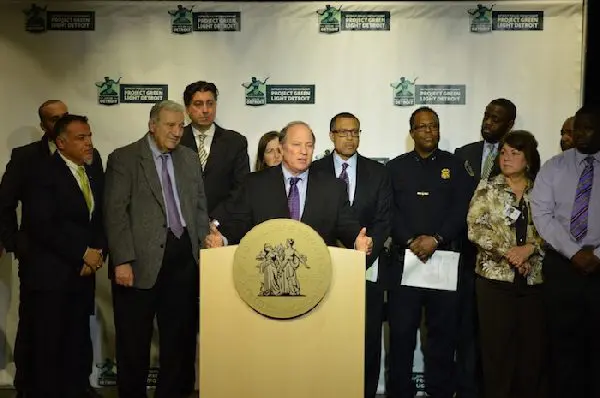
|
| Mayor Duggan, surrounded by city officials and community activists, at a press conference announcing Project Green Light, Jan. 11 |
DETROIT — Violent crime has been a massive obstacle in the recovery of Detroit’s neighborhoods. A disproportionate number of gas stations is turning into scenes for robberies and murder, so police are partnering up with businesses to protect customers at the pump.
Eight gas stations are streaming live video feed to the Detroit Public Safety Headquarters. And Mayor Mike Duggan is hoping to increase that number to 200 by the end of the year.
The program, dubbed “Project Green Light Detroit” was unveiled at a press conference on Monday.
Police Chief James Craig said “real time crime” allows the police to virtually patrol the gas stations and surrounding areas to tackle criminal trends and crackdown on unlawful activities in progress.
“This is an opportunity to go well beyond what we can expect,” Craig said.
Officials showed off the capabilities of the high definition cameras at the press conference, zooming in on the license plate of a police vehicle that was parked at one of the stations.
Duggan said the initiative will lead to a safer city by making it easier to identify and convict criminals.
“The violence level in the city is not acceptable,” the mayor said.
According to Duggan, up to 25 percent of the shootings and carjackings in Detroit occur at gas stations, liquor stores and other businesses that stay open late.
“These are… zones of danger where criminals know that you’re going to be stopped and be vulnerable,” he said.
Duggan said the initiative will serve as a deterrent against crime.
The mayor said the aim of the Project Green Light is to transform these small businesses into zones of safety, where potential wrongdoers know they are being watched and filmed by law enforcement.
The mayor said the city will soon have the ability to add four new locations to the program weekly.
Gas stations have to pay for the high definition camera and upgrade their lighting if needed. The cameras cost up to $6,000, according to Duggan. But the mayor said the investment would pay off “relatively quickly.”
Chaker Aoun, who owns a participating gas station on the west side of the city, said purchasing the equipment is worth it. He described the cost as is an investment in Detroit’s wellbeing, which could prove profitable in the long term.
“Those cameras give the customers more confidence to go out and shop,” he said. “But it’s not only about the individual gas stations. It’s about the safety of the neighborhood and the residents.”
However, Aoun said he hopes the city would provide some tax incentives or reduced fees for businesses that join the Green Light Project.
After the press conference, police and city officials headed to a participating Mobile gas station, on McNicholas and Wyoming.
There, the mayor stressed the importance of using innovative tactics to enhance public safety.
“You look at the way this country is responding to international terrorist threats— it’s by the use of technology,” he said. “The fact is, in Detroit, our homicides do not come from terrorists. They come from people locally. But it doesn’t mean we can’t use the same technology.”
He said the police department will soon start using facial recognition software.
Duggan brushed off privacy concerns, saying safety is a priority to residents.
The doors of the Mobile gas station display two signs that read, “Detroit Police Department Green Light Partner. Monitored at police HQ.”
Shaddad Alshadadi, the manager of the station, said he feels more secured at work because of the cameras.

“One Detroit”
Gas station owners endured a rocky relationship with City Hall for about a year and a half. The small business community complained of unjustified ticketing and hefty fees. Gas station and liquor store owners even accused the city of discrimination and threatened to sue the mayor’s office.
However, after Duggan met with the businessmen a few months ago, the relationship improved drastically, allowing the prospects of partnerships like Project Green Light.
Asked about the defused tensions, Duggan said two years ago, “everybody was fighting with everybody” in Detroit.
“We are building one Detroit,” he added.
The mayor said he and Chief Craig reached out to business owners to address their “legitimate” issues and present collaborative ideas.
Business advocate Nasser Beydoun echoed the mayor’s comments.
He said despite initial miscommunications, the businesses share the mayor’s vision for the city.
“It’s a partnership,” Beydoun said. “It’s one Detroit, and we are proud to be a part of it and invested in it.”
Mallak Beydoun, Detroit’s director of Constituent Affairs, who helped launch the Project Green Light, praised the mayor for encouraging cooperation between the city, businesses and the community.
To join Project Green Light, business owners can call Mallak Beydoun at 313-224-3703 or email GreenLightDetroit@detroitmi.gov.






Leave a Reply